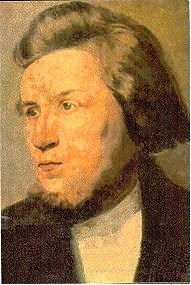The current trial of self-confessed Norwegian killer Anders Breivik highlights an important observation: one person can transform a nation by great evil … but also by great good.
As I teach in many countries about the need for the church to take seriously the Great Commission to disciple nations, people will ask, Can this really be done? The answer is a resounding YES! And the leadership for a movement for national transformation need not come from the “cultural elites,” i.e. the grass tops. It can come from the grass roots.
One of the examples is Norwegian Hans Nielsen Haugen (1771 1824). This simple farmer was called of God to proclaim the wholistic gospel of Christ to his beloved nation. At one point in his journey he was arrested and imprisoned for five years because as a laymen he was forbidden to preach the gospel.
 Hauge’s critique of the church in his day was that it had been reduced to meeting Christianity; this is not too different from our concept of the church today. The church is often defined by people sitting in a building looking at the back of the head of the person in front of them. It is attending prayer meetings, committee meetings, Bible studies, deacon meetings, etc. In Hague’s reading of scripture he understood that Christianity was comprehensive and that Christians needed to engage in, among other things, business to create economic health for families and reform of society. He believes the church functions not only as a gathered community but as individuals called into the market place and public square.
Hauge’s critique of the church in his day was that it had been reduced to meeting Christianity; this is not too different from our concept of the church today. The church is often defined by people sitting in a building looking at the back of the head of the person in front of them. It is attending prayer meetings, committee meetings, Bible studies, deacon meetings, etc. In Hague’s reading of scripture he understood that Christianity was comprehensive and that Christians needed to engage in, among other things, business to create economic health for families and reform of society. He believes the church functions not only as a gathered community but as individuals called into the market place and public square.
Sigbjørn Ravnåsen, the Haugian researcher and the Director of the Hauge Institute, wrote in his introduction to his 2004 essay on the life and work on Hauge:
No other person in the history of Norway has so dominated his own time and influenced the time following his death as Hauge. His combination of a Christian life, preaching and business activity contributed to the legalisation of the market as an institution, for Christians too, while it was given a clear social function. This was unique at that time. Hauge also formed a new religious philosophy, from the group to the individual: individuals were no longer only a part of a social group, but individuals with a responsibility for their own lives in keeping with what they learned. This contributed to a spiritual and mental liberation all over the country, and along with other social currents, Haugianism was a contributing factor to Norway’s receiving its own constitution and becoming independent in 1814.
In his book Wild Goose Chase, Pastor Mark Batterson reflects on the Celtic Christians’ description of following the lead of the Holy Spirit, who likened it to following a wild goose. You do not always know where the Spirit of God is leading. Often, God calls us to hear his voice and follow him without telling us where he is taking us. The patriarch Abraham is a perfect example (Genesis 12:1-4; Hebrews 11: 8-10). We are simply to trust him and follow.
Mark Batternson writes: “When it comes to doing the will of God, God-ordained passions are far more important than any human qualification we can bring to the table. In fact, God often uses us at our point of greatest incompetence. That way he gets all the credit” [emphasis mine]. Hauge’s life is a testimony of Batternson’s words. God’s call on this simple farmer was to believe Him and live out the passion of his heart for the transformation of his nation.
God can spark a movement of national reform using someone who, in the world’s eyes, is not qualified. If you are interested to see how He does that, read Ravnåsen’s short essay. Here is a life story of a man willing to follow the Wild Goose. Here is an example of how a poor person in a poor country can spark a movement of national transformation.
Be encouraged. Do not ask if you are “qualified.” Follow your passion!
– Darrow Miller






1 Comment
Jon
April 25, 2012 - 5:32 pm┈┈┈┈┈┈▕▔╲┈┈┈┈┈┈
┈┈┈┈┈┈┈▏▕┈┈┈┈┈┈
┈┈┈┈┈┈┈▏▕▂▂▂┈┈┈
▂▂▂▂▂▂╱┈▕▂▂▂▏┈┈
▉▉▉▉▉┈┈┈▕▂▂▂▏┈┈
▉▉▉▉▉┈┈┈▕▂▂▂▏┈┈
▔▔▔▔▔▔╲▂▕▂▂▂▏┈┈
Thumbs Up. 🙂